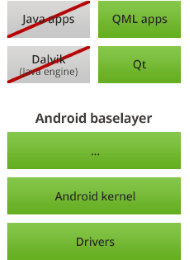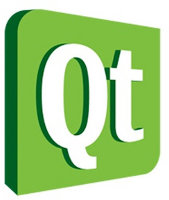Digia has recently announced Boot to Qt Technology Preview, a commercial offering that provides a solution for the creation of user interfaces on embedded systems. For the first version, they stripped out Android of Java, or other unnecessary parts (Zygote, SurfaceFlinger), added Qt/QML, and tested it on on ARM and x86 hardware. Boot to Qt includes the following main features: A light-weight UI stack for embedded Linux, based on the Qt Framework – Boot to Qt is built on an Android kernel/baselayer and offers an elegant means of developing beautiful and performant embedded devices. Ready-made images – We have images for several different devices which include the Boot to Qt software stack, making it possible to get up and running with minimal effort from day one. Full Qt Creator Integration – One-click deploy and run on hardware and a fully featured development environment. Simulator – A VirtualBox based simulator which allows device development […]
Qt on Embedded Systems – ELCE 2012
Lars Knoll, chief maintainer for the Qt Project, gives a presentation about Qt on embedded systems, including a demo with the Raspberry Pi at the Embedded Linux Conference Europe 2012 in Barcelona, Spain. Abstract: For well over 10 years, Qt has been used in many types of embedded devices, ranging from high-end medical systems, through mobile phones and smartphones, all the way to simple devices like coffee makers. This presentation will show some of the work that has been put in Qt throughout the years to support embedded devices, some of the challenges that the development team faced in order to bring a fully-featured desktop toolkit to resource-limited devices, along with solutions they came up with. Time permitting, the presenter will also show Qt demos running on an embedded device. This session is intended for embedded application developers looking to make use of the capabilities of recent hardware, as well […]
Digia and the Qt Project Release Qt 5.0
The Qt Project and Digia have announced the release of Qt 5.0, which is available via Qt 5.0 page on qt-project.org, or via qt.digia.com/qt5 for commercial customers. Qt 5.0 comes as a full SDK package including Qt 5 framework, Qt Creator 2.6.1, examples and full documentation. Qt 5.0 is available in source code and binary format for Linux (64 and 32 bit), Mac OS X (10.7 and 10.8), and Windows. You can read more about the main changes and new features compared to Qt 4.8, on my previous blog post about Qt 5 Alpha. A video showcasing some of the key features of Qt 5 has been uploaded to Youtube. The video above is actually a screen capture of a Qt 5 based application using Qt Quick, OpenGL and WebKit, running in a Mac. Audio has been added with iMovie application. You can try this Qt 5 Launch Demo by yourself by […]
Qt Creator 2.6 Release and Qt for Android (Necessitas) Merged to The Qt Project
Qt Creator Version 2.6.0 has been released yesterday. The most notable change is the introduction of “Kits” to replace “Targets” that were used in previous versions of Qt Creator. Previously, “Targets” such as Desktop or Remtoe Linux were added to a project’s configuration in order to use predefined configurations. “Kits” extend the use of “Targets” and contain settings for which device type to develop for, the sysroot, the compiler, the debugger and the Qt version to use, and possibly even more settings. Users can define their own “Kits”, which should facilitate control of build and run environment and projects sharing. Other changes include full screen support on Mac OS Lion and later, numerous fixes and additions to the qrc file editor, direct rebuilding and cleaning of .pro file based subprojects, more C++11 fixes, and more. On the platform side, QNX/Projects support was added, but Symbian (no maintainer) and Meego (due to […]





